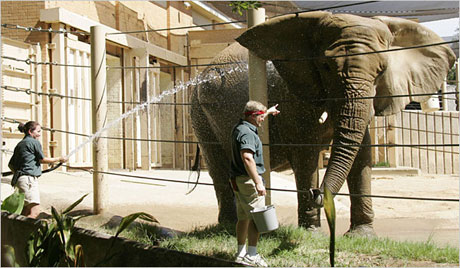Tragedy of elephants in the zoo
Life in a captive environment causes the average life expectancy and elephant health to be reduced by two to three times that of wild-type counterparts, according to a study, including the cause of elephant disease. enlarged.

The 22-year-old African elephant named Jenny at the American Dallas zoo.Photo: New York Times.
A group of British, Canadian and Kenyan scientists observed 4,500 elephants in Ambosseli National Park (Kenya), Myanmar forest enterprises and hundreds of zoos in Europe. They focused on comparing the average lifespan, health and fertility of female elephants. The results showed that, when living in captivity, elephant health and longevity decreased significantly.
For African elephants, their average life expectancy in the zoo is 16.9 years, compared with 56 years in the wild. Asian elephants only live on an average of 18.9 years in the zoo, while those living in the forest have a lifespan of up to 41.7 years. In a stable and convenient living environment, elephant life can be up to 70 years. About 30-50% of elephants in Kenya's forests live for 50 years or more.
The leading causes of death for elephants in captivity are those they never face in nature. Obesity is the number one killer for elephants in zoos and reserves. Eat well but don't have much space to exercise, most elephants living in captivity must cope with overweight.
"Elephants in the zoo are very susceptible to obesity. The amount of excess fat in the body causes them to die earlier because of cardiovascular disease and many other diseases. Overweight elephants often have large fetuses and most fetuses." "This risk is very high," said Ros Clubb, an expert with the British Society for the Prevention of Cruelty to Animal Behavior.
The phenomenon of stillbirths rarely occurs in elephants in the wild. Elephant mother pregnant for two years. They live in stable herds led by an elephant. The elephants in the herd take care of the baby elephants. In zoos and protected areas, mother elephants often have to live alone, enduring constant stress and labor in pain. Even some mother elephants killed their babies after birth because they did not know what little creatures suddenly appeared before their eyes. 'Many elephants in the zoo have never seen their babies,' explained Georgia Mason, an expert at the University of Guelph (USA).
Herpes disease is also a scary killer for elephants, especially Asian elephants. African elephants in nature are often infected with a form of herpes virus that makes them sick or uncomfortable. But when Asian elephants and African elephants live together in a zoo, the virus jumps to Asian elephants and transforms into a form that can be fatal.
'Zoos unknowingly create favorable conditions for viruses to attack Asian elephants. It killed many adult elephants, so the proportion of newborn elephants who died with their mothers increased, ' explained Georgia Mason.

Elephants in the wild environment.Photo: Static.
The risk of premature death in captive elephants also occurs when they are taken from one zoo to another zoo. Experts say that the change in accommodation makes elephants into a state of stress because they must be away from their families and their flocks. "In nature elephants have a habit of living in the herd, so separation often makes them panic," Ros explained.
Khyune Mar, who teaches at the Department of Animal and Plant Science at Sheffield University (UK), conducts research on wood-pulling elephants in SFEs in Myanmar. She found that their average life expectancy was 40, more than twice that of the 18.9 elephants in the zoo.
The researcher believes that the lifestyles of wooden elephants make them live longer, because elephants are free to act as they like in about half of their life. "They only catch elephants to work 6-8 hours a day, then they can travel freely in the forest. Elephants in the forest have a life similar to wild elephants. They are allowed to meet and mate with forest elephants, be mobilized and take good care of , 'Khyune said.
Stories about money for elephants also make us think. In the past 10 years, zoos around the world have spent about $ 500 million to build or upgrade captive areas to improve the lives of 250 elephants. But their efforts do not change their health or life expectancy.
Meanwhile in Kenya, nature conservation agencies are provided with only $ 20 million per year to take care of several tens of thousands of elephants. While Asian elephants are still facing extinction (only about 60,000), effective animal protection programs have helped increase the number of African elephants to half a million individuals.
- Why is it difficult to see elephants confirm?
- Rare dwarf elephants die in mass
- Why is the 'giant' elephant afraid of 'tiny' ants?
- Giant elephants release technology like smoke ... smoking in the forest in India
- Elephants turn into 'murderers' when migrated
- Video: Rescue the eleven elephants stuck in mud holes in Cambodia
- African elephants are evolving into ivory because of excessive poaching
- Vietnam forest elephants are in danger of extinction
- Elephants speak because they are so close to people
- Big body like elephants are afraid ... bees
- Diners become new threats of Thai elephants
- Accurate prediction of the tragedy in Paris
 Animal 'suffering' after hibernation
Animal 'suffering' after hibernation Why do goats climb well?
Why do goats climb well? Scientists were surprised to see chimpanzees eating turtles
Scientists were surprised to see chimpanzees eating turtles Giant catfish died deadly due to drought in Thailand
Giant catfish died deadly due to drought in Thailand